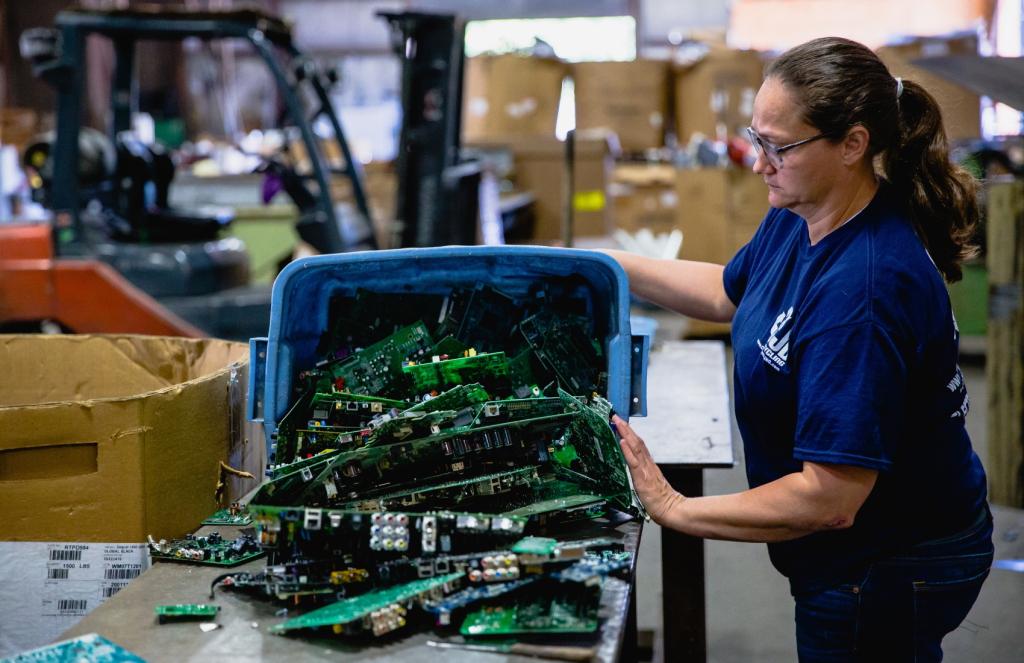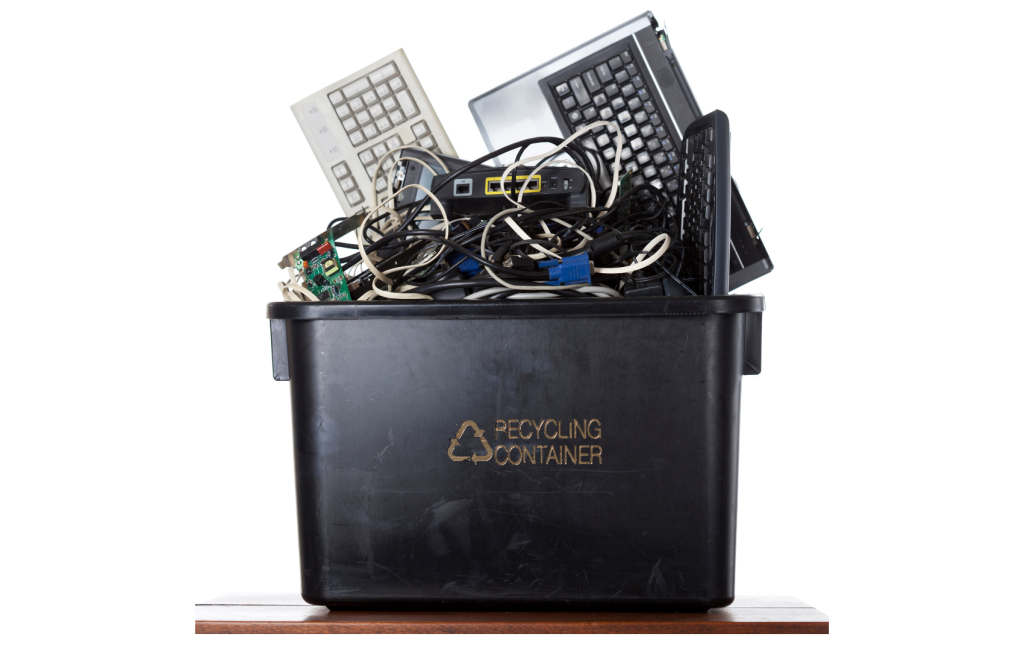The Complete Guide to Secure Computer Recycling: Protecting Your Data While Protecting the Planet
Every year, millions of businesses and individuals face a critical decision: what to do with their old computers, servers, and electronic devices. Here’s a startling reality – over 70% of data breaches involving disposed electronics could have been prevented with proper secure electronic disposal practices. Yet many organizations still rely on basic “delete” functions or amateur wiping methods, unknowingly putting sensitive information at risk.
At CJD E-Cycling, we’ve witnessed firsthand the consequences of improper electronic disposal. From law firms discovering client data on recycled hard drives to healthcare organizations facing HIPAA violations, the stakes have never been higher. But there’s good news: with the right approach to secure computer recycling, you can protect both your data and the environment simultaneously.
Understanding the Critical Need for Secure Electronic Disposal
The Hidden Dangers of Standard Electronics Disposal
When most people “delete” files from their computers, they assume the data is gone forever. This couldn’t be further from the truth. During our years of providing secure electronic disposal services, we’ve recovered supposedly “deleted” data from thousands of devices – including Social Security numbers, financial records, medical information, and confidential business documents.
Consider this real-world example from our experience: A small accounting firm donated their old computers to a local charity, believing they had properly deleted all client files. Months later, they discovered that tax records containing personal information of over 300 clients were still accessible on those devices. The resulting data breach investigation cost the firm over $50,000 in legal fees and damaged their reputation irreparably.
The regulatory landscape makes proper secure computer recycling even more critical. Organizations handling healthcare data must comply with HIPAA requirements, while financial institutions face SOX regulations. GDPR compliance affects any business dealing with European customers. The average cost of a data breach in 2024 reached $4.45 million – a price that makes professional secure electronic disposal seem like an incredibly wise investment.
The Growing E-Waste Environmental Crisis
Beyond data security, there’s an environmental imperative driving the need for proper electronic disposal. Electronic waste represents the fastest-growing waste stream globally, with over 50 million tons generated annually. These devices contain toxic materials like lead, mercury, and cadmium that can leach into groundwater when improperly disposed of in landfills.
Through our partnerships with certified recycling facilities, CJD E-Cycling has diverted thousands of tons of electronic waste from landfills. We’ve seen firsthand how responsible recycling recovers valuable materials like gold, silver, and rare earth elements that can be reused in new products. This circular economy approach reduces mining needs and minimizes environmental impact.
What Makes Computer Recycling “Secure”?
Professional Data Destruction Standards
True secure computer recycling goes far beyond simply reformatting a hard drive. At CJD E-Cycling, we follow the Department of Defense 5220.22-M standard, which requires multiple overwrite passes using specific patterns to ensure data is truly unrecoverable. We also comply with NIST guidelines for different security levels based on the sensitivity of your data.
For highly sensitive information, we employ physical destruction methods. I’ve personally witnessed hard drives being shredded into pieces smaller than a postage stamp – there’s no recovering data from that level of destruction. Every destruction process is documented with before-and-after photos, and clients receive a certificate of destruction that provides legal proof of proper disposal.
Beyond Just Wiping: Comprehensive Security Measures
Our multi-step verification process includes several checkpoints that standard computer disposal services skip entirely. After initial data wiping, we perform recovery attempts using professional forensics tools to verify complete data removal. If any data fragments remain detectable, we escalate to physical destruction methods.
Chain of custody documentation tracks every device from pickup to final disposal. GPS tracking on our vehicles, locked transport containers, and detailed inventory logs ensure your equipment never leaves our secure oversight. Our employees undergo background checks and regular security training because we understand that human elements can be the weakest link in data security.
The CJD E-Cycling Secure Disposal Process
Initial Assessment and Inventory
Every secure electronic disposal project begins with a thorough assessment. Our certified technicians catalog each device, noting model numbers, serial numbers, and estimated data sensitivity levels. This inventory becomes part of your permanent record and helps us recommend the appropriate security level for each item.
Recently, we worked with a regional hospital system upgrading their entire IT infrastructure. The initial assessment revealed that some older servers contained backup copies of patient records going back over a decade – data the hospital administrators weren’t even aware still existed. This discovery allowed us to apply maximum security protocols and prevented potential HIPAA violations.
Secure Collection and Transportation
Our collection process treats your data security as seriously as a bank treats cash transport. Devices are placed in locked containers immediately upon pickup, with tamper-evident seals that verify integrity throughout transport. Our vehicles are GPS-tracked and equipped with security cameras to document the entire journey.
For high-security clients, we offer supervised transport where a client representative can accompany devices to our facility. This extra layer of verification provides additional peace of mind for organizations with the most sensitive data requirements.
Data Destruction and Verification
The actual destruction process varies based on device type and security requirements. Standard hard drives typically undergo our multi-pass overwriting process using military-grade software. Solid-state drives require different techniques due to their unique storage methods – we use specialized tools that account for wear leveling and over-provisioning areas where data might hide.
For maximum security scenarios, physical destruction is the only acceptable option. Our industrial shredders reduce hard drives to pieces smaller than 2mm, while our degaussing equipment uses powerful magnetic fields to scramble any remaining magnetic signatures. Clients can witness this destruction process, and we provide detailed photographic documentation for their records.
One particularly challenging project involved a law firm disposal where individual client files required different security levels based on attorney-client privilege requirements. We developed a custom sorting and destruction protocol that maintained separate chain of custody for different file categories, ensuring each received appropriate security treatment.
Environmentally Responsible Recycling
After secure data destruction, environmental responsibility takes center stage. We partner exclusively with R2 (Responsible Recycling) certified facilities that meet the highest environmental and social standards. These partnerships ensure that valuable materials are recovered and reused while toxic substances are handled safely.
Our recycling partners provide detailed material tracking reports showing exactly how components from your devices were processed. Metals are sent to certified smelters, plastics to appropriate reprocessing facilities, and any hazardous materials to licensed treatment centers. This transparency allows our clients to include specific environmental impact data in their sustainability reporting.
Industries and Scenarios Requiring Secure Electronic Disposal
Healthcare Organizations
Healthcare providers face unique challenges with secure computer recycling due to HIPAA’s strict requirements for protecting patient health information. Medical devices, computer workstations, and servers in healthcare settings often contain years of patient data that must be completely destroyed to avoid regulatory violations.
We recently helped a medical practice that was closing after 30 years of operation. Their old computer systems contained patient records dating back to the 1990s, including X-rays, lab results, and treatment notes stored in various formats. Our forensic analysis revealed patient data in unexpected locations – temporary files, print spools, and even system logs that routine deletion would have missed entirely.
The destruction process for this project required HIPAA-compliant certificates documenting the complete elimination of all patient identifiers. The practice’s compliance officer was able to use our documentation to satisfy state medical board requirements and demonstrate due diligence to their professional liability insurer.
Financial Services
Banks, credit unions, and financial advisory firms handle some of the most sensitive personal data, making secure electronic disposal absolutely critical. Financial institutions must protect customer account information, Social Security numbers, and transaction histories while meeting various federal regulatory requirements.
During a recent bank branch closure project, we discovered that customer data existed in surprising places beyond obvious locations like servers and workstations. ATM computers, security cameras, and even digital copiers contained cached customer information. Our comprehensive approach identified and securely destroyed all of these data sources, preventing potential identity theft and regulatory violations.
Legal and Professional Services
Law firms face unique challenges because attorney-client privilege creates legal obligations that extend beyond typical data protection requirements. Different clients may have different confidentiality agreements, requiring customized destruction approaches for various types of information.
One corporate law firm we worked with had representation agreements spanning multiple decades and hundreds of clients. Some cases involved ongoing litigation where document destruction could create legal complications, while others contained routine business matters where standard secure disposal was appropriate. We developed a tiered approach that maintained separate chain of custody documentation for different client categories, ensuring appropriate handling for each situation.
Small Business Owners
Small businesses often assume they don’t handle enough sensitive data to warrant professional secure computer recycling, but this assumption can be costly. Even small businesses typically store customer contact information, employee records, and financial data that could create liability if compromised.
A local restaurant chain we worked with learned this lesson after nearly disposing of old computers through standard recycling channels. Our assessment revealed that their point-of-sale systems contained three years of credit card transaction logs – data that could have resulted in PCI compliance violations and potential credit monitoring costs for thousands of customers.
Red Flags: How to Identify Unreliable Electronic Disposal Services
Warning Signs to Avoid
Not all electronic disposal services provide adequate security for your data. Be wary of companies that can’t provide specific certifications for their destruction methods or refuse to offer certificates of destruction. Legitimate secure electronic disposal providers should be transparent about their processes and willing to answer detailed questions about their security procedures.
Extremely low pricing often indicates corners are being cut in security measures. Professional data destruction requires specialized equipment, trained personnel, and comprehensive documentation – services that come with real costs. Companies offering disposal services at prices that seem too good to be true probably are.
Questions to Ask Potential Providers
Before choosing a secure computer recycling provider, ask specific questions about their certifications, insurance coverage, and destruction methodologies. Request references from clients in your industry and ask about their environmental disposal practices. A reputable provider should welcome these questions and provide detailed, knowledgeable answers.
Making the Business Case for Secure Computer Recycling
Risk Mitigation ROI
The financial argument for professional secure electronic disposal becomes clear when comparing costs to potential consequences. A comprehensive secure disposal service might cost a few hundred to a few thousand dollars depending on volume, while the average data breach costs over $4 million. Even smaller breaches involving local businesses typically result in legal fees, notification costs, and reputation damage far exceeding the cost of proper disposal.
Many business insurance policies now include specific data breach coverage, and some insurers offer premium discounts for organizations that can demonstrate proper data disposal practices. The certificates and documentation provided by professional secure electronic disposal services help satisfy these insurance requirements.
Environmental and PR Benefits
Corporate sustainability reporting increasingly includes electronic waste disposal practices, and customers are paying attention to environmental responsibility. Proper secure computer recycling allows organizations to quantify their environmental impact reduction – tons of materials diverted from landfills, pounds of toxic substances properly handled, and percentages of materials successfully recycled.
These environmental benefits often translate into positive publicity and customer loyalty, particularly for businesses serving environmentally conscious consumers. The documentation provided by certified recyclers enables organizations to include specific metrics in their sustainability communications.
Your Next Steps Toward Secure Electronic Disposal
The intersection of data security and environmental responsibility doesn’t have to be complicated. Professional secure computer recycling provides peace of mind knowing that your sensitive information is completely destroyed while ensuring electronic waste is handled responsibly.
At CJD E-Cycling, we’ve built our reputation on providing comprehensive secure electronic disposal services that meet the highest standards for both data security and environmental protection. Our experience with thousands of disposal projects across multiple industries has taught us that every situation requires careful attention to detail and customized security approaches.
Whether you’re a healthcare provider needing HIPAA-compliant disposal, a financial institution meeting regulatory requirements, or a small business protecting customer information, secure electronic disposal is an investment in your organization’s future. The cost of professional service is minimal compared to the potential consequences of improper disposal, and the environmental benefits align with growing corporate sustainability expectations.
Contact CJD E-Cycling today for a free consultation about your secure computer recycling needs. We’ll assess your specific requirements, explain our security processes, and provide a detailed proposal for protecting both your data and the planet. Your sensitive information and environmental responsibility are too important to leave to chance.


